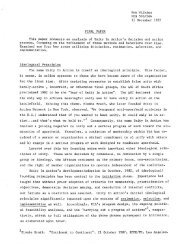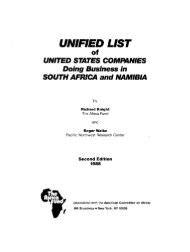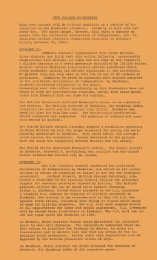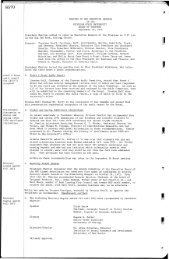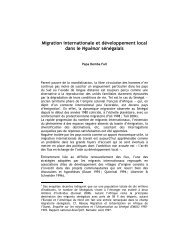- Page 3 and 4:
SANCTIONING APARTHEID Edited by Rob
- Page 5 and 6:
Introduction Robert Edgar CONTENTS
- Page 7:
South Afrimn Sanctions Breaking in
- Page 10 and 11:
a1 Center for Dedopment Poli~y; Lut
- Page 12 and 13:
2 Directing the Export-Import Bank
- Page 14 and 15:
sources are identified or tapped. A
- Page 16 and 17:
South Africa's credit rating and it
- Page 18 and 19:
system and Conpzsional dissatisfact
- Page 20 and 21:
Works, Ways and M-, Interior, and E
- Page 22 and 23:
12 Sanctioning Apartheid The diffic
- Page 24 and 25:
through Swadmd and take advantage o
- Page 26 and 27:
Despite the mounting evidence that
- Page 29 and 30:
IMFLEMENTATION OF THE A m- APARTHEI
- Page 31 and 32:
Implementah of the Anfi-Apartheid A
- Page 33 and 34:
Implementation of the Anti-Aparthei
- Page 35 and 36:
Implementatiotl of the Anti-AprfM R
- Page 37 and 38:
Implementation ~f the Anti-Aparthei
- Page 39 and 40:
Emplementation of the Anti-Aparthei
- Page 41 and 42:
Implemenkrtion of the Anti-Aparthei
- Page 43 and 44:
ntpiementation of the Anti-Aparthei
- Page 45 and 46:
Implementation of the Anti-Aphid Ac
- Page 47 and 48:
Imp&- I m p l m h of the An ti-Apar
- Page 49 and 50:
Implmtafion of the Anti-AprChejd Ac
- Page 51 and 52:
hqlmfatibn of fhe AnfrLAphid Act of
- Page 53 and 54:
Implementation of the Anti-Aparthei
- Page 55 and 56:
Imphtafion of the Anki-A+ Ad of 198
- Page 57 and 58:
Implan~1Wh of the Anti-Apartheid Ac
- Page 59 and 60:
1- of the Anti-ApaW Ad of 1986 4. L
- Page 61 and 62:
Implmfrxliotr of fhe Anti-Apartheid
- Page 63 and 64:
ImplmtnU of the Anti-Apmiheid Act o
- Page 65 and 66:
Implementation of the Anti-Aparthei
- Page 67 and 68:
THE SOUTH AFRICA-ISKAEL ALLIANCE, 1
- Page 69 and 70:
The South Af&~-heI Anh8 1986-1988 5
- Page 71 and 72:
The South Afrr'ci-Israel Alliance,
- Page 73 and 74:
coIlaboration. The total Israeli co
- Page 75 and 76:
The South Aftrca-Israel Alliance, 1
- Page 77 and 78:
SANCTIONS, DISINVESTMENT, AND US CO
- Page 79 and 80:
S m h , Disimtment, and US Corpmnti
- Page 81 and 82:
S a m J Disirmestmmt, and US Corpor
- Page 83 and 84:
Sancfions, Disimestment, and US Cor
- Page 85 and 86:
S m h , Disimtmt, and US Corpmation
- Page 87 and 88:
Sanctions, Disim)mwtt, and US Gnpmf
- Page 89 and 90:
Sanctions, Disinvesfmnt, and US Cor
- Page 91 and 92:
Sutrcfions, Disimiment, and US Gorp
- Page 93 and 94:
Sanctions, Disimstment, and US Gqwr
- Page 95 and 96:
emoved the immediate pressure on So
- Page 97 and 98:
Sanctions, Disinvestment, and US Co
- Page 99: Su-# Disimbt, nnd US Corpemtiolns r
- Page 102 and 103: 92 Sanctioning Apartheid to disinve
- Page 104 and 105: elevance: people were asked directl
- Page 106 and 107: 0nehaSwa~thefierp~geandhDstilea~tud
- Page 108 and 109: had suffered psychoIogically). "The
- Page 110 and 111: ment would amount to a dosing d m o
- Page 112 and 113: ut at the same time it is isdemhhg
- Page 114 and 115: Sanctionkg Apartheid military optio
- Page 116 and 117: Sanctioning Apartheid Asikpd: 64; N
- Page 118: and to feel that it has brought ver
- Page 122 and 123: affechg business confidence in that
- Page 124 and 125: abes have chopped to just over 12%
- Page 127 and 128: 17re Impact of New Sanctions agains
- Page 129 and 130: The Impact of New Sanctions againsf
- Page 131 and 132: 7Ice Impncf of New Sandions agninsl
- Page 133 and 134: The Impd of Nao Smh'm against South
- Page 135 and 136: The Impact of Neut Sanctions agains
- Page 137 and 138: The Iftff~ct of Nau Sanctions again
- Page 139 and 140: The Impncf of New Sanctions against
- Page 141 and 142: The Inrpf of New Sancriens against
- Page 143 and 144: The Impact of New Sanctions against
- Page 145 and 146: The Imp& of New bctions against Sou
- Page 147 and 148: The Imp3 of Near Sunclions against
- Page 149: The I mpd of Neut Sandimrs against
- Page 153 and 154: that &e&dy block off US tramnationa
- Page 155 and 156: Trnnsnrriioml Mnnufiwturing-Finance
- Page 157 and 158: Tmmtionnl ManuJachrring-Finance Lin
- Page 159 and 160: (Nickel and al- (21) (1.0) (191 (0.
- Page 161 and 162: Table 4 South African bade with Afr
- Page 163 and 164: sanctions measure than the trade sa
- Page 165 and 166: Tmffmntional ManuJncturing-Finance
- Page 167 and 168: mufaduring jobs from the US southea
- Page 169 and 170: ~ m ' chairman, s Hugh McColl, comm
- Page 171 and 172: Tmnmatiml MnnuJkturing-Finnnce Link
- Page 173: TmnsnaM Manufacturing-Finance Links
- Page 176 and 177: year-fnrm overseas by means of larg
- Page 178 and 179: Sanctioning Aptheid SASOL'S chinam,
- Page 180 and 181: ernbarga must not be revealed to th
- Page 182 and 183: funds. The main funds invoIved are:
- Page 184 and 185: consideration. Among them are the e
- Page 186 and 187: Titening the Oil Embargo It is clea
- Page 188 and 189: Sanctioning Apa~theid obvious from
- Page 190 and 191: Sanctioning Aprfheid was $13 with a
- Page 192 and 193: Smtimting Apartheid South Africa. T
- Page 194 and 195: effort. Through the 1970s and early
- Page 196 and 197: Despite the new US restridom, the c
- Page 198 and 199: 188 Sanctioning Apartheid hardware
- Page 200 and 201:
Sanctioning Apmfheid Components for
- Page 202 and 203:
3. Additional details but governmen
- Page 205 and 206:
GOLD ANP) INTERNATIONAL SANCTIONS A
- Page 207 and 208:
Gold and Inmtional Sanctiorrs again
- Page 209 and 210:
Gold and International Snnclions ag
- Page 211 and 212:
Gold and Intematiml Sanctions again
- Page 213 and 214:
Gold and Inkrmtiotral Sanctions aga
- Page 215 and 216:
Gold and Intermtianal Sanctions aga
- Page 217 and 218:
Gold mtd I ntmW Sanctions against S
- Page 219:
&Ed mrd InSernntimI Sanctions again
- Page 222 and 223:
African foreign debt. This extracti
- Page 224 and 225:
C Industrial plants, commercial jet
- Page 226 and 227:
216 Sanctioning Apmtheid basic indu
- Page 228 and 229:
218 Sanctioning Apartheid Zurich, i
- Page 230 and 231:
Tabk 4 -tee of the hdde d t e n- to
- Page 232 and 233:
credits can be checked for consiste
- Page 234 and 235:
Table 6 Foreign debt of South Afdca
- Page 236 and 237:
Table 7 South African external debt
- Page 238 and 239:
228 Sanctioning Agnrtheia in the bi
- Page 240 and 241:
Sanctioning Apartheid largest contr
- Page 242 and 243:
232 Sanctioning Apartheid Y: When t
- Page 244 and 245:
Sanctioning Apartheid Table 9 Total
- Page 246 and 247:
Sancfioning Apartheid There has bee
- Page 248 and 249:
errors and omissions were over $1 b
- Page 250 and 251:
foreign assets of artother $0.96 bi
- Page 253 and 254:
SANCTIONS AND SOUTH AFRICA: AN ANAL
- Page 255 and 256:
South qFiDals Sttutegic M i d Eqm&
- Page 257 and 258:
South Afn'm's Sfrategic M i d Erpor
- Page 259 and 260:
swrh A)%mRs SStrafegic M i d Exporf
- Page 261 and 262:
Table 4 5986 Vanadium Imports by Co
- Page 263 and 264:
Failwe to include a ban on strategi
- Page 265 and 266:
THE FRONTILINE STATES AND SANCTIONS
- Page 267 and 268:
The Fmtiine States and Sanctions ag
- Page 269 and 270:
The Fmtline Sfafes ad Snncti~ns aga
- Page 271 and 272:
The Frontline States and Satfdions
- Page 273 and 274:
The Fmtline Stutes and Snnctions ag
- Page 275 and 276:
Th Fmfline Stufes ad Sntrctirms aga
- Page 277 and 278:
7% FnmfZine S W nnd Sanctions again
- Page 279 and 280:
The Fronflim Stub and Sanctiolrs np
- Page 281 and 282:
The Frontline States nnd Sancfions
- Page 283 and 284:
The FnmtIine SMes and Sanctions aga
- Page 285 and 286:
The Frontline Sfata and Sanctions a
- Page 287 and 288:
The Fmtline Sfab and Sanctions agai
- Page 289 and 290:
The Fnnrtline States and Sunctiuns
- Page 291 and 292:
The Fmfline States d Sanctions agai
- Page 293 and 294:
The Fmtline States a d Sundons agai
- Page 295 and 296:
The Frontline Sfafa d Sntrctiotrs a
- Page 297 and 298:
7%e FrontIine SMis and Sanctions ag
- Page 299 and 300:
The FmtIine Sfates and SancW agains
- Page 301 and 302:
The Pfwrtline Sfafes nnd Sawfirms a
- Page 303 and 304:
THE POTENTIAL FUR SOUTH AFRICAN SAN
- Page 305 and 306:
The Potential fos South AFan Sancti
- Page 307 and 308:
The Potential fol South Afican Sanc
- Page 309 and 310:
17te Potmlinl for South African San
- Page 311 and 312:
The Pofenlinl for South Afican Sanc
- Page 313 and 314:
The Potential for South Afn'mn Sanc
- Page 315 and 316:
Tk Potential fm South African Sanct
- Page 317 and 318:
The Potenrial fur South Afriran San
- Page 319 and 320:
The Potential for South African San
- Page 321 and 322:
The Pofential fm South African Sanc
- Page 323 and 324:
The Potential Jor Sou fh AFmn Sanct
- Page 325 and 326:
The Potenfin1 fir South African San
- Page 327 and 328:
The Potential fot South Africmt San
- Page 329 and 330:
The Potential for South African San
- Page 331:
The Potenfial for South African San
- Page 334 and 335:
324 Sanctioning AparthPid sanctions
- Page 336 and 337:
326 Sanctioning Apartheid by the So
- Page 338 and 339:
328 Sancfioning Apartheid return to
- Page 340 and 341:
EI, goods could legally be exported
- Page 342 and 343:
Sanctioning Apartheid supply, franc
- Page 344 and 345:
Srmctioning Apartheid Notes 1. EFOm
- Page 346 and 347:
336 Sancticming Apartheid IS. 19. S
- Page 348 and 349:
33. Indeed, if one aooepts the prop
- Page 350 and 351:
of the constraints on that behavior
- Page 352 and 353:
342 Sancfioning Apartheid sustained
- Page 354 and 355:
344 Sanctioning Apartheid even in r
- Page 356 and 357:
346 Sanctioning Apartheid has, ever
- Page 358 and 359:
348 Sanctioning Apartheid it, even
- Page 360 and 361:
Sanctioning Apartheid ly higher tha
- Page 362 and 363:
overthrow of apartheid will find th
- Page 364 and 365:
Sanctioning Apartheid African gover
- Page 367 and 368:
ZIMBABWE IN THE FRONTLrnE Introduct
- Page 369 and 370:
Zimbabwe in the Frontline Third, ev
- Page 371 and 372:
Zimbabwe in the Frontline 361 a con
- Page 373 and 374:
Zimbabwe in the Frontline Less tang
- Page 375 and 376:
Zimbah in the Frontline 3# to aroun
- Page 377 and 378:
Zimbntrwe in the Frontline 367 In l
- Page 379 and 380:
Zimbabwe in fhe Frontline Table 3 M
- Page 381 and 382:
40 35 30 2 5 C t 0 0 20 b a 15 10 5
- Page 383 and 384:
Zimbabwe in the Frontline third wun
- Page 385 and 386:
Zimbabwe in the Frontline be in an
- Page 387 and 388:
Zimbabwe in the Frontline 1. The S
- Page 389:
Zimbabwe in the Frontline 379 Une i
- Page 392 and 393:
382 Sanctioning Aprtheid art and cu
- Page 394 and 395:
cont-imes, sancbions "the instrumen
- Page 396 and 397:
386 Smrctioning Apartheid has been
- Page 398 and 399:
388 sanctioning Apmtheid oom-from t
- Page 400 and 401:
Sanctioning Apartheid %ruth African
- Page 402 and 403:
392 Sanctioning Aparthtid boptt ear
- Page 404 and 405:
and many other oountries have organ
- Page 406 and 407:
Reg@ Feldman, %Am Never Said Sport
- Page 408 and 409:
In recent years, this cultural boyc
- Page 410 and 411:
Sanctioning Apartheid Supporters of
- Page 412 and 413:
402 Smrctioning Apartheid be pamadl
- Page 414 and 415:
404 Sanctioning Apartheid Akiam com
- Page 416 and 417:
406 Sanctioning Apartheid The Boyco
- Page 418 and 419:
able to incorporate the sounds of b
- Page 420 and 421:
Sanctioning Apartheid 6. Thegwemmen
- Page 422 and 423:
This is not meant bo suggest, count
- Page 424 and 425:
Middle East affairs, His latest boo
- Page 426 and 427:
sanctioning Apmtheid completing a b
- Page 429 and 430:
A World Apart 393 Abidjan 270 acade
- Page 431 and 432:
Caltex 745,176 Cambwfie 21 Canaaa 7
- Page 433 and 434:
Employment B m u of Afrio rnA) 344
- Page 435 and 436:
hael 57-66,125-25,32526, 290, m, 33
- Page 437 and 438:
- NatIanal M d i e QlmJR) 133,150,
- Page 439 and 440:
'Imael 658 LReotho 39-56 ail 6, W25
- Page 441 and 442:
StabI Cbb 5,83,84,152 Standard Bank
- Page 443:
Zambia 11,150,160,162,166, 26142,26


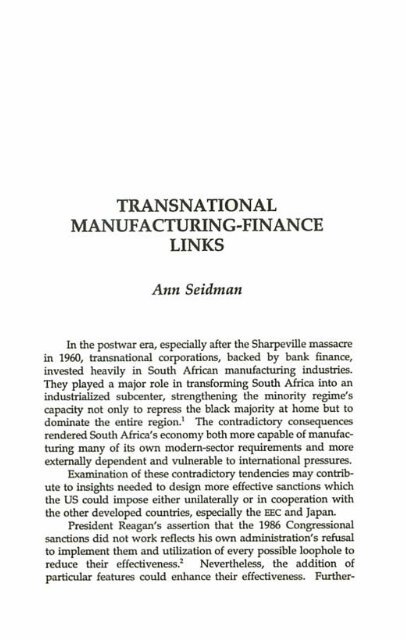



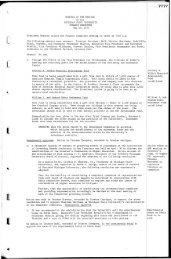
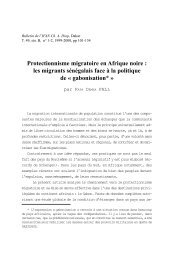

![Synthèse [6] DEFALL..INSTRAW.pdf - Matrix](https://img.yumpu.com/17880734/1/190x245/synthese-6-defallinstrawpdf-matrix.jpg?quality=85)


